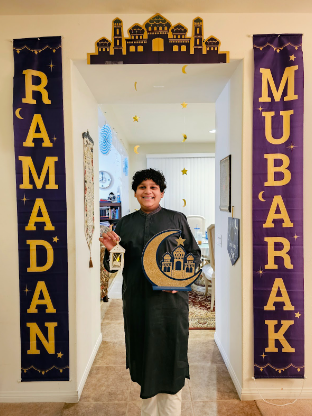Ramadan: What Does it Mean For Students?

Ramadan is a holy time where Muslims fast both spiritually and physically for 30 days, and celebrate the creation of the Quran.
April 18, 2023
You wake up for school and check your phone. On the screen, you see a news notification announcing: “Islamic holy month of Ramadan celebrated around the world,” What is Ramadan? Why do people participate in it? And what does this mean for students on Day Creek Campus?
Although the dates vary, Ramadan is a month in the Islamic year, in which Muslims fast to improve their physical and mental state. It’s a time of spiritual growth and self-reflection for many, which all started when the Quran, a sacred Islamic book, was dictated to the prophet Mohammed, marking the beginning of the holy fast.
“[Ramadan] is a big holiday [where] we fast and pray. The purpose of Ramadan is to get closer to God, to fast every day, and mostly to improve ourselves physically and mentally,” said Sami A.
Ramadan is not only to think of how people can improve themselves but also about others who may be less fortunate to have certain things. It is a way to experience the things in life so you can become a better version of yourself.
“It teaches you to be grateful about what you have, and just to be grateful about getting food everyday [such as] being able to eat three times a day.” said Tahiyah I.
During Ramadan, Muslims must not eat food from dusk till dawn for a month, and breaking this commitment leads to a bigger obligation of the fast.
“When Ramadan begins you fast for 30 days and if you break your fast, you have to make it up by fasting for 60 more days,” said Zeynep O.
The human body as a student also brings along its own trials to the human body, as abstaining from eating and drinking water takes its toll.
“It affects me a lot, like in P.E. it’s super difficult, like sometimes you could faint or get strokes,” said Zareen Y.
After the month of fasting, Muslims commemorate their commitment and completion of the challenge with a celebration by eating lots of food.
“[After Ramadan], we have a holiday called Eid. We celebrate our 30 days of fasting and we eat. When you eat, it’s a big feast,” said Tahiyah I.
Even though abstaining from eating may be a big obstacle, the benefit of Ramadan comes from the sacrifices that are made. This is what makes the challenge meaningful and rewarding for Muslims.
“Those habits that you do during Ramadan, you carry them through the entire year. You’re trying to improve yourself. The benefits of Ramadan is that when we fast, it’s good for our health because we’re not eating. So people may lose weight, and spiritually after it’s done, we feel refreshed,” said Sami A.
Through fasting and acts of devotion, Muslims take a big step towards self renewal while creating a closer connection to God. However, the deeds that Muslims cultivate during Ramadan are expected to be used in their daily lives throughout the year. By doing so, the habits they carried out are integrated into their mindset, creating a lasting impact.
“[During Ramadan], when you stop doing bad stuff, your life becomes so much better. It changes how you view life. It’s meant to prevent you from doing bad things. It’s more like a vaccine, not a cure,” said Mohamed M.





